| Srl | Item |
| 1 |
ID:
165693
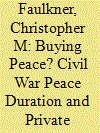

|
|
|
|
|
| Summary/Abstract |
Do Private Military and Security Companies (PMSCs) impact peace duration after civil war? I argue that the role these organisations play in a conflict can impact post-conflict stability. Specifically, I suggest that variance in services provided by PMSCs can influence rebels’ calculations about relative capabilities. These calculations then contribute to the probability for civil war recurrence. Building on the bargaining framework, with a focus on information and commitment problems, this article demonstrates that PMSCs participating in armed combat operations can jeopardise the stability of peace following civil war. Three case narratives (Angola, Sierra Leone and Croatia) are used to probe the theoretical argument and results are illustrative – PMSCs serving as force multipliers contribute to an increase in the probability for conflict recurrence.
|
|
|
|
|
|
|
|
|
|
|
|
|
|
|
|
| 2 |
ID:
119282
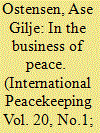

|
|
|
|
|
| Publication |
2013.
|
| Summary/Abstract |
Private military and security companies increasingly perform services for the UN. The article describes how these companies are used by the UN organization and become part of UN operations. Their participation influences the planning and implementation of UN peacekeeping. By performing tasks such as protective security, security training, peacekeeper training, counselling and intelligence, private companies influence both the epistemological and operational dynamics of peacekeeping. This not only diffuses authority over peacekeeping into the commercial market, it often happens with a very low degree of transparency.
|
|
|
|
|
|
|
|
|
|
|
|
|
|
|
|
| 3 |
ID:
109824
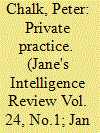

|
|
|
| 4 |
ID:
134402
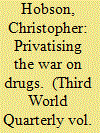

|
|
|
|
|
| Summary/Abstract |
A defining feature of the ‘9/11 wars’ has been the prominent role played by private military and security companies (pmsc). The growth of this market for military and security services has not gone unnoticed. Yet the role pmsc have played in supporting the US-led war on drugs has largely gone under the radar, both literally and figuratively. The aim of this article is to look at the activities of pmsc funded by the USA in Latin America, and to consider the specific consequences that arise from employing them in the field of counter-narcotics. It is argued that the use of pmsc further entrenches a costly and unsuccessful way of dealing with drugs. There is a need to move from a strict prohibitionist stance and consider alternatives to the war on drugs approach, but the use of pmsc creates another strong vested interest in maintaining an increasingly problematic and costly status quo.
|
|
|
|
|
|
|
|
|
|
|
|
|
|
|
|
| 5 |
ID:
103221
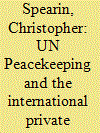

|
|
|
|
|
| Publication |
2011.
|
| Summary/Abstract |
UN peacekeeping continues to confront qualitative and quantitative difficulties. Arguments in favour of using private military and security companies (PMSCs), particularly those referring to the 1990s-era when Executive Outcomes was operating, have been aired. The article examines earlier operational arguments for PMSC participation in UN peacekeeping, which at times have been reintroduced in more recent assertions: (1) PMSCs have better organization, training, and equipment; (2) they have a heightened willingness to apply force to serve UN mandates; and (3) they enjoy enhanced readiness to respond. The article argues, however, that it would be difficult for contemporary PMSCs to respond effectively, quickly, and robustly should the UN turn to them for enforcement operations. State and market pressures have conditioned PMSCs to operate in a manner dissimilar to that in the 1990s.
|
|
|
|
|
|
|
|
|
|
|
|
|
|
|
|